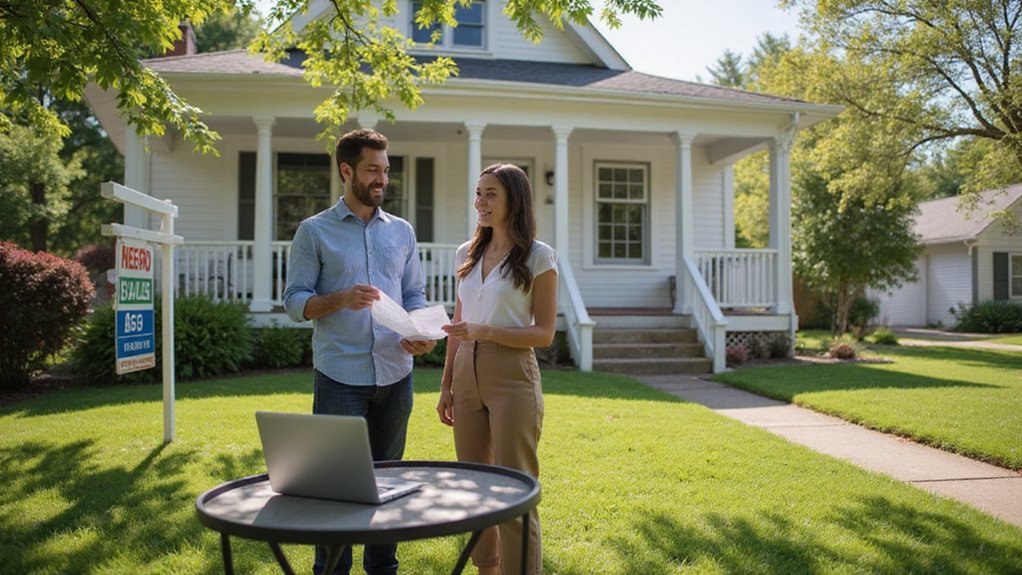Caught between dream homes and financial constraints, homeowners frequently wonder about their FHA options after selling property. Moving to a new city, upgrading for a growing family, or downsizing creates real challenges with mortgage approvals. Fortunately, the FHA program offers pathways for previous borrowers seeking another government-backed loan after selling.
Yes, you can get another FHA loan after selling your current home if you meet certain requirements. The FHA typically allows only one loan at a time for primary residences, with exceptions for relocation or family size changes. You’ll need to complete the sale first and satisfy credit, income, and legitimate need qualifications.
In this blog I will explore everything about qualifying for another FHA loan after selling your home.
Key Takeaways
- You can qualify for a new FHA loan after selling your previous primary residence, provided you meet current eligibility requirements.
- Typically, FHA rules require selling your first home before applying for another FHA loan, with proper documentation of the sale.
- Exceptions for second FHA loans exist if you relocate for work, family reasons, or meet specific eligibility criteria.
- A waiting period and proof of sale are usually necessary to re-establish eligibility for a new FHA loan.
- Alternatives like cash sales can expedite home selling and help requalify for a new FHA loan more quickly.
What is an FHA Loan?

An FHA loan is a mortgage insured by the Federal Housing Administration. It helps people buy homes with lower down payments and less strict credit requirements.
FHA loans allow down payments as low as 3.5% and credit scores as low as 580. These loans make homeownership possible for first-time buyers and those with financial challenges.
The government backing reduces lender risk. As a result, banks offer more favorable terms to borrowers who mightn’t qualify for conventional mortgages.
Borrowers must pay mortgage insurance premiums with all FHA loans. Furthermore, these loans can only be used for primary residences, not investment properties.
Can You Get Another FHA Loan After Selling Your House?

Yes, you can qualify for another FHA loan after selling your house. FHA rules require the new property to be your primary residence. You must prove your eligibility following the sale of your previous home.
The process involves demonstrating genuine need for relocation. Most lenders will verify you lived in your previous FHA-financed home for at least one year. This requirement helps prevent investment speculation.
Financial qualifications also matter after selling. Your credit score, debt-to-income ratio, and employment history will be evaluated.
A smooth transition often depends on proper timing between selling and applying for the new loan.
What Are the FHA Rules for Getting a Second Loan?

FHA typically allows only one loan at a time.
You must meet specific exceptions to qualify for a second FHA loan while still holding your first one. These exceptions include relocating for work, family expansion needs, or having a co-borrower situation.
A waiting period applies between FHA loans. You generally need to sell your current FHA-financed property before qualifying for another loan.
This requirement ensures you don’t overextend your finances.
However, special circumstances might exempt you from these limitations.
Each situation receives individual consideration based on your financial position and needs.
How to Apply for Another FHA Loan After Selling?
To apply for another FHA loan after selling, you need to provide documentation showing you sold your previous home, like a HUD-1 statement or closing disclosure.
Make sure you’ve re-established your eligibility by meeting credit, income, and occupancy requirements before submitting your application.
Timing matters—coordinate your sale and new purchase to avoid gaps that could delay approval.
Documentation of Home Sale
You need HUD-1 settlement statements or closing disclosures when applying for another FHA loan. These documents prove you’ve sold your previous FHA-financed property.
FHA rules require clear evidence of the property sale before approving a new loan. The paperwork confirms you’ve met all repayment obligations from your previous mortgage. Your eligibility for a new FHA loan depends on this documentation. Most lenders will request these papers during the initial application process.
Additionally, the timing of your sale might affect your qualification status.
You must satisfy all FHA requirements before moving forward with another loan application.
Re-establishing Eligibility
You can re-establish FHA eligibility after selling your previous home by meeting specific requirements. First, document the completed sale of your former FHA-financed property. Next, verify you meet current income and credit standards for a new loan.
FHA rules require you to intend to use the new property as your primary residence. The home must meet FHA’s property standards through an official inspection. Lenders will examine your debt-to-income ratio carefully during this process.
To complete the process, submit all sale documentation and proof of occupancy plans to your lender. Most approvals happen within 30-45 days when all paperwork is in order.
| Step | Requirement |
|---|---|
| 1 | Confirm sale of previous FHA home |
| 2 | Meet income and credit standards |
| 3 | Secure new primary residence |
| 4 | Submit documentation for approval |
Timing Your Application
You should apply for a new FHA loan only after your previous home is sold and you’ve moved into the new property. FHA rules require documentation of the sale and proof of primary residence before approving another loan.
The optimal window is 30-60 days after closing your previous home. This timeline allows mortgage records to update in the system.
During this waiting period, gather necessary documents like closing statements and your new lease agreement. These papers will support your application.
Proper timing prevents delays and improves your chances of approval for the new loan.
What Exceptions Allow Multiple FHA Loans Simultaneously?
FHA allows multiple loans in specific situations despite its one-loan rule. You can qualify for a second FHA loan when relocating for work more than 100 miles away.
Family size increases that make your current home inadequate also create eligibility for another loan.
Non-occupying co-borrowers may obtain their own FHA loans separate from shared properties.
Leaving a jointly owned home after divorce qualifies you for a new FHA loan.
Special exemptions exist for borrowers recovering from foreclosure who meet certain financial criteria.
These exceptions ensure FHA loans remain accessible when legitimate life changes occur.
How Does Selling Your Home Impact FHA Mortgage Insurance?
When you sell your FHA-financed home, mortgage insurance ends once the loan is paid off. Your sale proceeds will cover the remaining loan balance, automatically terminating MIP payments.
No refunds are available for past MIP payments when selling.
The timing of your sale matters for specific FHA mortgage insurance considerations. Early sales typically result in complete MIP forfeiture.
FHA loans originated after June 2013 carry MIP for the entire loan term unless you make a 10% down payment.
However, if you’re refinancing to another FHA loan, you might qualify for a partial MIP refund. This option is only available within three years of your original loan closing.
What Are Alternatives to Another FHA Loan?
If you’re not eligible or want to avoid another FHA loan, consider alternatives like conventional mortgages, which often require higher credit scores and bigger down payments.
VA and USDA loans offer great options for eligible buyers, with fewer restrictions and lower costs.
You could also sell your home for cash, bypassing financing hurdles altogether and closing faster.
Conventional Mortgage Options
Conventional mortgages offer alternatives to FHA loans with different requirements. These loans typically require credit scores of 620 or higher and down payments starting at 3%.
You can choose from 15, 20, or 30-year terms based on your financial goals.
Most conventional loans eliminate the permanent mortgage insurance required by FHA loans. This results in potentially lower monthly payments after building 20% equity.
Traditional lenders, credit unions, and online mortgage companies all offer conventional loan products.
With proper planning, conventional financing provides more flexibility and fewer restrictions than government-backed options.
VA and USDA Loans
VA and USDA loans offer excellent alternatives to FHA financing with minimal down payments. These programs provide competitive rates and fewer ongoing costs for qualified borrowers.
VA loans require military service, while USDA loans are for rural properties with income limits. You can pursue these options even if you already have an FHA loan. Many homebuyers find these programs more affordable long-term.
Furthermore, both loan types often eliminate the need for mortgage insurance. The application process follows similar steps to conventional loans but with specialized eligibility verification.
Cash Home Sale Advantages
A cash home sale offers many benefits compared to FHA loans. You can avoid credit score requirements and down payment rules with this approach.
The process typically closes faster than traditional mortgage sales. Most cash transactions complete in 1-2 weeks rather than 30-45 days.
Additionally, you won’t pay monthly mortgage insurance premiums. This creates immediate financial relief for your budget.
Furthermore, you’ll gain quick access to your home equity.
With these funds available, you can address other financial needs promptly. The straightforward process also reduces paperwork and stress.
Need to Sell Fast Before Getting Your Next FHA Loan? Contact Shawn Buys Houses Today
Yes, Shawn Buys Houses can help you sell fast before your next FHA loan. FHA rules require you to sell your current home before qualifying for another FHA loan in most cases.
The process involves listing your property, finding a buyer, and completing paperwork promptly. Our cash buying service eliminates delays from traditional financing.
Furthermore, we purchase homes in as-is condition, saving you renovation costs and time. This advantage helps you quickly reestablish eligibility for your next FHA mortgage.
After selling, you can immediately begin searching for your new dream home with confidence.
Frequently Asked Questions
How Long Must I Wait to Qualify for Another FHA Loan After Selling?
You typically need to sell your previous FHA home and reestablish eligibility before qualifying again. While there’s no set federal waiting period, lenders may require a reasonable time to confirm your new primary residence and financial stability.
Can I Use a Different Property as Collateral for a New FHA Loan?
No, you can’t use a different property as collateral for a new FHA loan until you sell your previous FHA-backed home and meet eligibility requirements. Ensure your new residence is your primary property to qualify.
Are There Credit Score Requirements for Multiple FHA Loans in Oklahoma City?
Yes, you need a minimum credit score of 580 for FHA loans in Oklahoma City. If your score is between 500-579, you’ll need a 10% down payment. Maintain good credit to qualify for multiple FHA loans.
Does Selling My FHA Home Affect My Ability to Qualify for a VA or USDA Loan?
Selling your FHA home doesn’t impact your VA or USDA loan eligibility, as long as you meet their specific requirements and sell your previous property properly. You can qualify again quickly, helping others achieve their homeownership dreams efficiently.
What Documentation Is Needed to Prove the Sale of My Previous FHA Property?
Like a detective uncovering clues, you need your HUD-1 statement or closing disclosure to prove your previous FHA property sale. Submit these documents promptly, showing you no longer own that home, to qualify swiftly for your new loan.


